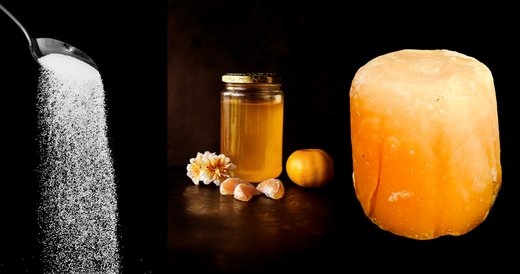
Sugar Vs Jaggery Vs Honey: Which is Healthiest Sweeter?
When looking forward to a healthier life, the sweetener we select dramatically affects our well-being. While sugar is commonly used, jaggery and honey have gained popularity as they are believed to be healthier alternatives.
Health-conscious individuals increasingly favour these options. This article presents the pros and cons of each sweetener, allowing you to make an informed choice.
You can choose the best option based on your eating and health goals.
Comparison between Sugar, Jaggery & Honey
| Comparison basis |
Sugar |
Jaggery |
Honey |
|
Source |
Sugarcane, sugar beets |
Sugarcane juice, palm sap |
Flower nectar |
|
Processing |
Highly processed and refined |
Minimally processed |
Minimally processed |
|
Main Components |
Sucrose (glucose + fructose) |
Sucrose, minerals, antioxidants |
Glucose, fructose, enzymes, vitamins, minerals |
|
Flavor |
Very sweet, little other flavor |
Deep, caramel-like flavour |
Floral, fruity, varies by variety |
|
Colour |
White |
Golden brown |
Pale yellow to dark brown |
|
Nutrients |
Negligible |
Some minerals, antioxidants |
B vitamins, amino acids, antioxidants |
|
Glycemic Index |
60-65 (high) |
50-60 (Moderate) |
50-60 (Moderate) |
|
Calories (per 100g) |
387 |
383 |
304 |
|
Use |
Sweetener, baking |
Sweetener, traditional dishes |
Sweeteners, spreads, beverages |
What is Sugar?
Sugar, a kind of sweet crystalline carbohydrate, is collected and made from many different plants. The most common sources of sugar production are sugarcane and sugar beetroot. Sugar contains mainly sucrose, a type of disaccharide consisting of glucose and fructose molecules. When we process sugar, we start with either sugarcane or beetroot juice.
This sugar contains calories and a typical sweet taste, yet it is not very beneficial in nutrition besides essential carbs. Although fruits, vegetables, and dairy items contain natural sugars, "sugar" usually signifies the type added during production. This highly processed sugar is found in sweets, sodas, and many pre-packaged meals. Overeating sugar has been linked with problems such as weight, diabetes, and tooth damage.
Here are some pros and cons of sugar:
Pros:
- It provides a quick energy boost
- Enhances flavours and improves taste
- Inexpensive and readily available
- Long shelf life
- Versatile for cooking and baking
Cons:
- Highly processed with no nutritional value
- High glycemic index spikes blood sugar levels
- Overconsumption linked to weight gain, diabetes, and other health issues
- It can be addictive and contribute to sugar cravings
- It may increase inflammation in the body
Nutritional profile of Sugar

|
Nutrient |
Amount per 100g |
|
Calories |
387 kcal |
|
Carbohydrates |
99.98 g |
|
Sugars |
99.98 g |
|
Protein |
0 g |
|
Fat |
0 g |
|
Fibre |
0 g |
|
Calcium |
1 mg |
|
Iron |
0.01 mg |
Also read:
What is Jaggery?
Jaggery is a traditional form of non-centrifugal cane sugar from Asia and Africa. It is boiled and evaporated fresh sugarcane juice or palm sap until the liquid thickens and hardens into a gritty, molasses-like consistency. Jaggery is dark brown in colour with a unique, rich flavour similar to caramel or syrup.
Unlike highly processed refined white sugar, jaggery preserves some nutrients and antioxidants in sugarcane juice. This offers it some nutritional advantage over white sugar, but it remains rich in calories and should be used in moderation. South Asian cuisines rely heavily on jaggery for sweet desserts, drinks, and savoury foods.
Here are some pros and cons of jaggery:
Pros:
- It is less processed than white sugar
- It contains some minerals like iron, magnesium, and potassium
- It has antioxidants from the sugarcane/palm sap
- Lower glycaemic index, so it doesn't spike blood sugar as much
- Richer, more complex flavour than white sugar
Cons:
- It is still high in calories and should be consumed in moderation
- It may cause digestive issues in some people
- Harder to find and more expensive than regular sugar
- It doesn't dissolve as quickly as white sugar in batters/doughs
- Can affect the texture and browning of baked goods
Nutritional profile of Jaggery
|
Nutrient |
Amount per 100 grams |
|
Calories |
383 |
|
Carbohydrates |
97 grams |
|
Protein |
0.4 grams |
|
Fat |
0.1 grams |
|
Fibre |
0.6 grams |
|
Iron |
11 mg |
|
Calcium |
85 mg |
|
Phosphorus |
20 mg |
What is Honey?
Honey is a sweet, viscous dietary material made by honey bees from the nectar of flowers. Bees gather sweet nectar, convert it into simple sugars, and store it as honey in honeycombs. The flowers used by bees determine the specific flavour and colour of honey. It consists primarily of glucose, fructose, and other sugars, enzymes, amino acids, vitamins, and minerals.
Unlike refined sugar, honey is lightly treated in its natural form, the honeycomb. While honey is rich in calories, it contains minor antioxidants and has a sweetness that some prefer over white sugar. Honey, valued for its distinct flavours and supposed health benefits, has long been used as a natural sweetener and in medicine.
Here are some pros and cons of honey:
Pros:
- Natural sweetener with minimal processing
- It contains antioxidants and nutrients like vitamins, minerals
- Lower on the glycemic index than sugar
- It has antibacterial and anti-inflammatory properties
- Variety of flavours depending on the nectar source
Cons:
- It is still high in calories and sugar content
- It may cause spikes in blood sugar levels for diabetics
- Potential to cause allergic reactions or infant botulism
- More expensive than refined sugar
- Limited shelf life and vulnerable to crystallization
Nutritional profile of Honey
|
Nutrient |
Amount per 100g |
|
Calories |
304 kcal |
|
Carbohydrates |
82.4 g |
|
Sugars |
82.12 g |
|
Protein |
0.3 g |
|
Fat |
0 g |
|
Fibre |
0.2 g |
|
Calcium |
6 mg |
|
Iron |
0.4 mg |
|
Magnesium |
2 mg |
Which is the right choice between Sugar vs Jaggery vs Honey?

The best sugar, jaggery, or honey option depends on your unique dietary needs and goals. Here's a quick summary to help you make an informed decision:
Sugar is the most processed, with little to no nutritional value besides pure sucrose. While refined sugar tastes delicious, excessive intake has been related to a variety of health concerns, including weight gain, diabetes, and tooth damage.
Jaggery, a traditional sugarcane or palm sap sweetener, is less refined than sugar and contains minerals and antioxidants. Its lower glycaemic index makes it a healthier choice for individuals who monitor their blood sugar levels.
Honey, a bee-produced natural sweetener, is the least processed of the three. It includes trace levels of vitamins, minerals, and antioxidants, and its low glycemic index makes it an appealing option for those looking for a healthy sweetener. However, honey is still high in calories and should be used in moderation.
Finally, if you're seeking a healthy sweetener with nutritional advantages, jaggery or honey are better options than refined sugar. However, moderation is essential, as all sweeteners are high in calories and can lead to weight gain and other health problems if used excessively.
Conclusion
To sum up, all three should be used with caution when it comes to sweeteners. But honey and jaggery appear to be healthier choices compared to refined sugar. Honey is only slightly processed and contains small amounts of vitamins, minerals, and antioxidants.
It also has a lower glycemic effect than white sugar. Jaggery is less processed than white sugar; however, it still holds some minerals and antioxidants from the sugarcane or palm sap, which was its original source.
If you want to have something sweet but also nutritious, then honey and jaggery are the best choices. But always remember that for any sweetener you use, consider your dietary needs and control the amount.
FAQs
Q.1 Is brown sugar healthier than white sugar?
Brown sugar is slightly better in nutrition compared to white refined sugar. This is because it has a small quantity of molasses. However, there is little distinction between the two types of sugars, and they are categorized as added sugars that we should keep under control.
Q.2 How does the glycemic index of jaggery compare to sugar?
Jaggery possesses a lower glycemic index (GI), with a value around 50-60, in contrast to refined sugar (60-65). This suggests jaggery affects blood sugar levels slowly.
Q.3 Is honey a good sugar substitute for people with diabetes?
Although honey has a glycemic index less than sugar, it still contains high amounts of fructose and calories. People with diabetes should be careful about using any sweetener, including honey.
Q.4 Can I substitute jaggery for sugar in baking recipes?
You can use jaggery in place of white sugar in several recipes. However, jaggery's moisture level may affect the texture and browning.
Q5. Is raw honey better than regular honey?
Raw honey undergoes minimum processing, retaining more pollen and minerals. However, nutritional differences are minimal when compared to conventional filtered honey.
Check other Honey comparisons:
Honey or Jaggery | Stevia vs Honey | Organic Honey vs regular Honey | Wild Flower Honey vs Regular Honey | Set Honey vs Clear Honey | Neem Honey vs Manuka Honey | Clover Honey vs Wildflower Honey | Manuka Honey vs Acacia Honey | Maple Syrup vs Honey | Manuka Honey vs Buckwheat Honey





Leave a comment
This site is protected by hCaptcha and the hCaptcha Privacy Policy and Terms of Service apply.